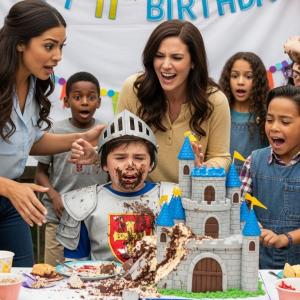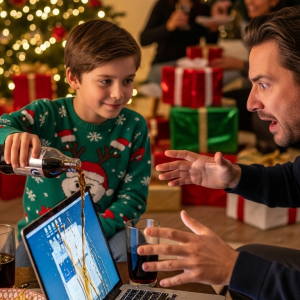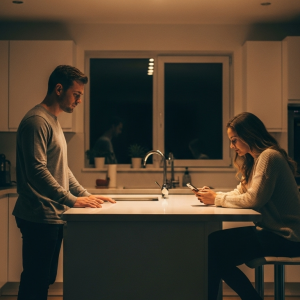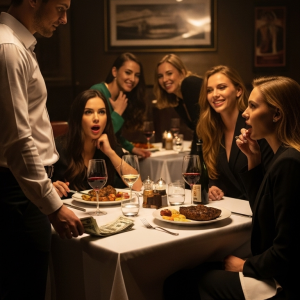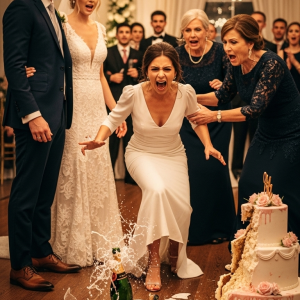My name is Jenna. My daughter, Sarah’s, first birthday was meant to be soft and forgettable in all the best ways. It was a small gathering in our backyard with mismatched folding chairs, paper plates, and kids shrieking with joy. The kind of day you post a few grainy photos of and then move on. I had no intention of remembering it permanently, at least not in the way that I do now.
The air smelled of citronella candles and charred hamburgers. Sarah was in a pale yellow romper, one shoe already missing. My husband, Rick, stood beside me, awkwardly holding her as we all sang “Happy Birthday” too loudly. My sister, Donna, cracked a joke about our tone-deaf family, and everyone laughed. It should have been a perfect, ordinary day.
Then my mother, Eleanor, arrived late, as usual, with a gift too enormous for the occasion, wrapped in shiny gold paper as if for a royal coronation. Eleanor never knew how to read a room; all she knew was how to walk in and adjust its temperature to her liking. She kissed Sarah’s head without looking at her, then turned to me, smiling with her lips but not her eyes.
“You look tired,” she murmured, just loud enough for Donna to hear. “Still carrying that baby weight, huh?”
I laughed, a quick, instinctive defense I’d honed over a lifetime of her cuts. Rick tried to divert her, but she waved him away, her eyes surveying the party like a general inspecting a battlefield.
The incident occurred as we were attempting to convince Sarah to blow out her single candle. Everyone crowded around, phones out. I leaned in close, bracing Sarah’s small fingers as she reached for the flame. Then, my mother leaned down, her lips almost next to my ear, and whispered the words that would change everything.
“She’s going to grow up ugly. Like you.”
I did not turn. I did not blink. I froze, mid-smile, one hand on my daughter’s wrist, the other gripping my phone. The candle flickered, Sarah sneezed, and the flame went out. Everyone applauded. The moment passed, but for me, it didn’t.
Later that night, after Sarah was asleep, I sat on the couch, Browse through the photos from the party. I was looking for something specific, though I didn’t know what at first. Then I found it. It was a fuzzy, overexposed shot of the moment at the cake. My face was in that strange half-smile you make when something feels deeply wrong. And there, in the corner of the shot, just visible behind my shoulder, was my mother. Her face was near mine, her lips curved like a hook, her eyes laser-focused.
Nobody else in the photo seemed to notice. But I saw it. I saw her. I had proof. It wasn’t just in my head. This time, I had a snapshot of the exact moment my brain said, enough.
That was the first picture I removed her from. I opened my editing app and started small. I cropped her out. I removed her shadow. Then I moved on to the group photos. The one where she’s near the grill. The one where she’s holding Sarah, but not really holding her, her arms stiff as if the baby were made of knives. Delete. Crop. Paint over. It became addictive, like cleansing a wound you were unaware was still bleeding. The next day, I printed ten of my best, newly edited photos and displayed them in Sarah’s room. Every single one of them was beautiful, bright, cheerful, and utterly devoid of Eleanor.
Donna was the first to notice. She texted me a few days after I posted the revised album online. “Hey, where’s the picture of Mom holding Sarah?”
“The one from the cake didn’t come out right,” I replied, which was technically true.
That night, I had a dream about a family portrait, but whenever I tried to smile, my mother would lean in and whisper something, causing my face to crumble like wet paper. I awoke with a scorching determination in my chest. I was not going to let Sarah grow up hearing the same poison I had. I was not going to let my mother write herself into my daughter’s story the way she had written herself into mine.
If she didn’t want to love Sarah properly, she wouldn’t get to love her at all.
I took out my phone and began looking through every album, every memory, every digital space my mother had ever touched. And I started erasing her. Picture by picture. Word by word. Memory by memory.
There’s a difference between forgetting someone and deciding they don’t deserve to be remembered. I didn’t truly understand it until I remembered how my mother used to call me “thick around the middle” when I was twelve. Not with malice, but with a tiny tilt of her voice, as if diagnosing a problem.
By sixteen, she’d upgraded the insult to “plain.” I remember brushing my hair the night before prom, and hearing her say through the door, “She’s just… forgettable. Maybe it’s the eyes.” As if I weren’t right there. As if I weren’t trying to obliterate myself faster than she could.
At twenty-two, when I told her I wanted to move across the country for graduate school, she didn’t flinch. She just muttered, “You were probably a mistake, anyway,” as if reading from a grocery list. I didn’t cry. I just nodded. What else can you do? You either let it soak into your bones or spit it out before it sticks. I let it settle for years.
But now, I have Sarah. And something about becoming a mother makes you want to shield your child from the world. I picked protection. I dug deeper than photos. I found the old flash drives, the cloud backups, the printed albums. Eleanor at my wedding, a tight-lipped smirk on her face. I opened the image in an editor and meticulously painted her out. Gone. The space she had occupied was now filled with light. It looked better without her.
Next, I removed her from the shared family calendar. Birthdays, appointments, holidays—wiped away. I altered the location of Sarah’s upcoming daycare picnic and only shared the new information with people I trusted.
Rick, my husband, was watching me out of the corner of his eye, like a man watching a woman who has suddenly started carrying a knife. One night, he asked, “Are you going to tell her?”
I shook my head. “She doesn’t deserve closure. She never gave me any.”
And that was the most honest sentence I had spoken aloud in months. She wasn’t getting a courteous phone call. She would figure it out the same way the rest of the world does: through absence.
Absence, however, carries its own weight. She must have felt it, because less than a week after I cut her out of the picnic, she showed up on my doorstep.
It was a late Thursday afternoon. The doorbell rang. I knew it was her before I even opened it. Eleanor stood there, clutching a lavish gift bag, wearing her frozen half-smile. She didn’t begin with a question or an apology. She simply said, “Thought I’d drop this by for Sarah.”
I remained in the doorway and did not move aside. Inside, Sarah, who had been humming and playing with blocks, looked up, then toward the door, then back down at her blocks.
My mother’s face flickered with perplexity, the corners of her lips sagging just slightly. She waited for Sarah to get closer, for that innate, infantile need to reach out to a familiar adult. But it never came. In that instant, something sharp and decisive clicked into place. Even babies recognize when love isn’t genuine.
I took the gift bag from her hands without a word, placed it on the table without looking inside, and said the only thing that needed to be said. “I think it’s time for you to leave.”
She did not argue. She did not yell. She just nodded once and turned, her heels clicking against the hardwood as she walked out of the house. I wasn’t going to burn down the house with her inside. I was just making sure she never got a key again.
I always assumed that if anyone was going to support me, it would be my sister. Donna grew up in the same house. She was there when our mother called me dramatic for crying at our dad’s funeral, then whispered to her, “Thank God it wasn’t you, sweetheart.” We used to laugh about it, calling her “Jekyll and Mom.” But we never dug deeper.
So when Donna finally texted, “Can we talk?”, I knew what was coming.
She arrived with coffee and a tense expression. “You’ve been editing her out of everything,” she said, her words cautious. “Isn’t that a bit much?”
That’s when I decided to show her the photograph. The one from Sarah’s birthday. I handed it to her.
“She said Sarah would grow up to be ugly. Like me,” I told her directly.
Donna stared down at the photograph for a long time. I saw her eyes skim the faces, the frozen moment of me in mid-smile, my body stiffening. I waited for the denial, the deflection. But it didn’t come.
Instead, she spoke, almost too quietly. “I thought you looked happy in this one.”
I shook my head slowly, exhausted. “Do you really think I was?”
She didn’t respond. That quiet broke something in her. Not enough to rebuild trust, but enough to consider that maybe, just maybe, I was the one telling the truth.
The bomb dropped that night. Eleanor made a Facebook post. A public status that all her friends, neighbors, and elderly church ladies could see.
It read: “My daughter has poisoned my relationship with my granddaughter. Pray for me during this painful time. Some people don’t know what family means until it’s too late.”
It was shared 17 times in the first hour. Comments poured in, sending hugs and prayers. One woman wrote, “You’re still her mother. Don’t give up on her yet.”
I read it all in the dark of my kitchen, my hands shaking. I considered leaving it unanswered. But then I realized that quiet was what had kept me shackled for so long.
So I broke the silence with a single comment on her page. Just one.
“You should pray for the woman in this photo,” I wrote, and attached the unedited picture from Sarah’s birthday, the one with her mother’s cruel, hooked smile. “She doesn’t exist anymore.”
By morning, there were over 200 comments. Some supported her, some backed me. But the ones that struck the deepest were from people asking what really happened. For once, she did not have control of the story.
Following the final confrontation, there is an unusual silence. The social media dust settles. The door you close behind someone no longer rattles. That was the solitude I awoke to on Thursday morning.
I had been thinking about the baby book for months. I started writing it by hand. I wrote the narrative of Sarah’s birth, her first laugh, how she preferred sweet potatoes over carrots. I wrote about Rick installing her crib in the middle of the night.
But I did not write about Eleanor. Not once. Not as a footnote, not as a background character. She was a ghost, and ghosts do not belong in baby books. Each page was a little insurrection. Each line of ink was a way of saying, “You don’t get to live here anymore.”
Rick watched me work on it in silence. One night, he took the finished book from my hands and delicately placed it on the shelf above Sarah’s changing table, as if it were holy. And perhaps it was. The next morning, Sarah toddled over to that shelf, pointed with one chubby finger, and spoke her first proper sentence.
“Nana gone.”
I did not cry. I simply smiled, got down to her level, and said, “Yeah, baby. She is.”
For a while, that was enough. The quiet gathered around us.
But six months later, a letter arrived. No return address. The envelope had my name on it, in a handwriting I hadn’t seen in years. I considered burning it. But I opened it.
There was a photograph inside. Me, at 13. No makeup, bad braces, an oversized t-shirt. I was smiling, a genuine, embarrassed, hopeful smile. I had the impression that the person behind the camera adored me.
On the back, she had scribbled one line.
“You were never ugly. I just didn’t know how to love pretty things.”
No apology. No explanation. Just a confession laced with cowardice, the truth arriving too late to matter and too early to forgive. I stared at the photo for a long time. Not because I missed her, but because I wanted to remember the girl in the picture. I wanted to remember that despite everything, I still thought I was worth seeing.
I didn’t write back. I didn’t call. But I didn’t throw away the photograph, either. I kept it. Not for her. For me. A reminder of what I had survived.
